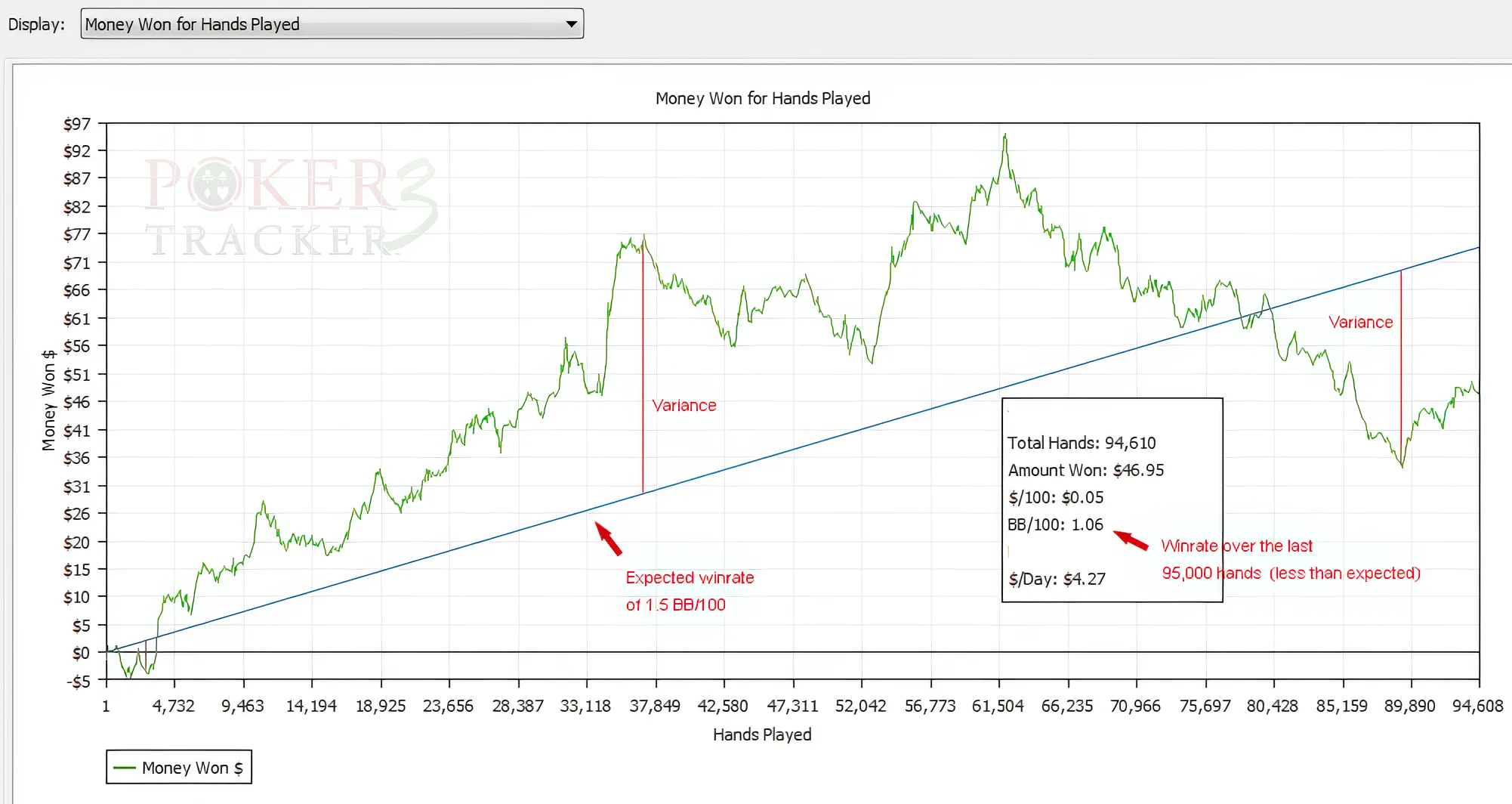Why So Many Poker Players Are Broke: The Truth Nobody Talks About


- Fact Checked by: PokerListings
- Last updated on: July 5, 2025 · 7 minutes to read
On the outside, poker is portrayed as a game with big wins, gold bracelets, and a glamorous lifestyle. But that’s merely a glimpse of reality.
Poker rarely depicts financial stress, massive losses, or players owing hundreds of thousands of dollars to their backers. The fact is, poker leaves most players broke or just scraping by. The piece below analyzes why most poker players go broke and lose in the long run.
The Poker Dream vs. the Grind
If you ask an amateur player what high-stakes games are, they will tell you about fancy casinos and players making thousands of dollars a night. What you see on YouTube and Instagram about poker makes it look like a quick way to get rich and have financial stability.
And here’s the truth: most players break even or lose in the long run. Data from top online poker sites, such as PokerStars and 888poker, shows that only around 10-15% of players win in the long run, while the majority either break even or end up losing money.
Reddit user reflecting on 15 years of full-time grind chasing the poker dream:
The Poker Dream
byu/For56 inpoker
Poker is more like a job for the few people who make it regularly than a hobby for most. Long hours, huge downswings, self-discipline, and always trying to get better are all part of a winning poker player.
Most grinders aren’t sipping cocktails in Las Vegas; they eat frozen meals at 3 a.m. after playing a losing session online for 12 hours.
Getting in love with the poker dream is normal. Who wouldn’t want to work for themselves, travel the world, and get paid to do something they enjoy?
Most players, however, don’t put in the work, as they are primarily motivated by the desire to earn easy money. When players are focused on quick wins, they forget about the hard work that sets long-term winners apart from amateurs.
How Variance Destroys Bankrolls
Variance, or the fact that short-term results are always random due to luck, is one of the most challenging realities of poker.
Sometimes, even the best players have big slumps where they lose a lot of hands or don’t get the cards they need.
These periods can last for weeks or months and have a significant impact on a player’s cash flow.
People who rely on poker as their sole source of income often find these slumps particularly challenging to overcome. In contrast to a regular job with a steady pay cheque, poker income fluctuates significantly.
A player on Reddit recounted how he lost half of his bankroll in 10 hours:
Just lost half my bankroll in 10 hours
byu/Yuupf inpoker
If a player doesn’t have any other means of income or cash, they might not be able to pay their bills during a bad run.
As a poker player, you might be surprised by how much variance can affect your mental and financial health.
Being unable to handle losses during downswings can lead people to desperation, which can result in poor choices, such as chasing losses or raising the stakes too high.
A significant reason many players go broke is that they struggle to manage their emotions and bankroll effectively.

The Game Is Getting Harder
Poker isn’t the same as it was in the early 2000s. No longer is it “easy money” to play games online with huge fields full of fish who don’t have a clue what they’re doing.
Today’s average player is more knowledgeable, having studied more and having access to tools and training that were unavailable 20 years ago.
Everything has changed because of Solvers. Many players are now learning GTO (Game Theory Optimal).
There are coaching camps, Discord groups, HUDs, and YouTube channels that regularly post hand analysis videos. It’s no longer enough just to be good. You’re left behind if you don’t work to get better and stay ahead of the curve.
Many broke players don’t understand that. They believe that they can win if they “play solid”. However, what we now consider “solid” would have been cutting-edge ten years ago, and it may not be perfect now.
As more players get better, the overall win rate is going down, the edges are getting smaller, and you need to be smarter just to stay ahead of the competition.
Players who fail to study or employ outdated tactics can expect to lose.
Ego Is the Silent Bankroll Killer
People who play poker are usually extremely confident and competitive. They believe they can deceive others and consistently outmaneuver their opponents. However, that same confidence can quickly turn into ego, and ego comes at a high cost.
Some broke players aren’t exactly terrible at poker; they are just stubborn. They wouldn’t move down the stakes when they are losing.
In the context of a game, these players couldn’t accept their losses. This “I already know enough” attitude prevents these players from learning new facets of the game or utilizing tools like extensive database analyses and solvers.
Adapting to change is the key to success in a game that is constantly evolving.
Players often struggle to be honest with themselves when they have an inflated ego. They don’t review their hands or fix leaks, but blame variance.
They tell themselves they were “unlucky” instead of working on tilt control. Over time, this mindset causes them to remain stagnant, harm themselves, and ultimately lead to bankruptcy.
No Backup Plan or Exit Strategy
Many grinders view poker as more than just a job; it’s a way of life. It’s hard for them to imagine a life besides “a poker player” because they’ve been doing it for so long.
It’s especially true for people who skip or drop out of school, quit their regular jobs, or base their social life around poker.
Unfortunately, poker jobs don’t last forever. It stops being fun to play. Smaller edges. Mental energy wanes.
Players find themselves in a challenging situation when they stop winning, especially if they have not saved or established a safety net.
A common problem is that numerous players do not prepare for this reality. They believe that they will always be able to win, get back on track, and keep going.
When they lose everything, many have no backup plan, degree, or means of earning money. Not only are they financially broke, but they’re also professionally and mentally lost.
The scariest aspect of it is that poker players often find it harder to leave the game after a while. Some stay in the game because it’s all they know, not because they love it.
Stop Blaming the Game, Start Owning It
Most poker players aren’t broke because of bad luck. They’re broke because they won’t do the work.
There’s more to it than just “running bad”. Many of these so-called grinders fail to follow through with their plans or manage their finances effectively. Poker is more like a game to them than a job.
They attempt to minimize losses, review their hands, and act as if their leaks are only temporary. After this, they go on X or poker forums, posting that the regs are “not being creative anymore.”
Even top poker pro and coach Bencb talked about how the average poker player doesn’t understand what it takes to be successful:
Most players don't understand that it is not about playing good poker, but rather being a good poker player.
— bencb (@bencb789) February 14, 2022
This includes not only bankroll management & tilt control but also networking, nutrition, working out, taking breaks, practicing self-awareness, relationships (1/3).
Some people prefer discussing poker instead of playing it effectively. While other players have time for drama, placing bets, and discussing plot theories, they do not have time to review preflop charts or adjust to pool tendencies.
The harsh truth is that poker does not owe you anything. Despite this, many players perceive the game as flawed because it doesn’t immediately yield a six-figure sum.
Who are the real winners? They approach the game as if it’s a business. They worked harder than those who are still dreaming and think they’re almost successful. It’s more than just talent. It’s about being professional.
So if you’re broke, ask yourself: Are you unlucky or are you just lazy? If that stings, good. Maybe it’s time to stop blaming the game and start owning the grind.
Wrapping Up
Poker is a game where the only outcomes are winning or losing. It doesn’t matter how much you need the money, how sure you are of yourself, or how much you want it.
It rewards hard work over hopes and dreams. If you are consistently losing money, it may not be due to variance. You could be the problem. You must study and improve your game.
You may have tried to recover what you lost. Your ego may have led you to believe you are better than you are.
The point is not to ridicule you, but to make you pay attention. To become a long-term winner, you need to treat poker like a business.
That means you have to show up every day, review your game, fix and identify any leaks, keep track of your bankroll, and prepare for the expected downswings.
There’s no easy way out. You don’t owe the game anything. But poker can still recognise people who work better, not just faster, as long as they are honest with themselves, put in the work, and stay humble.
-
- 100% up to $2000
T&Cs Apply | Play Responsibly | GambleAware
18+ | Play Responsibly | T&C Apply
-
CoinPoker4.1
- 33% Weekly
- 150% up to 2000$
T&Cs Apply | Play Responsibly | GambleAware
+18 / T & C apply / Play responsible
-
Stake.US Poker4.3
- Rakeback 5%
- $55 Stake Cash + 260K Gold Coins
T&Cs Apply | Play Responsibly | GambleAware
18+ | Play Responsibly | T&C Apply
-
- 100% up to $1000
T&Cs Apply | Play Responsibly | GambleAware
T&Cs Apply | Play Responsibly | GambleAware
-
T&Cs Apply | Play Responsibly | GambleAware
18+ | T&Cs Apply | Play Responsibly | GambleAware


